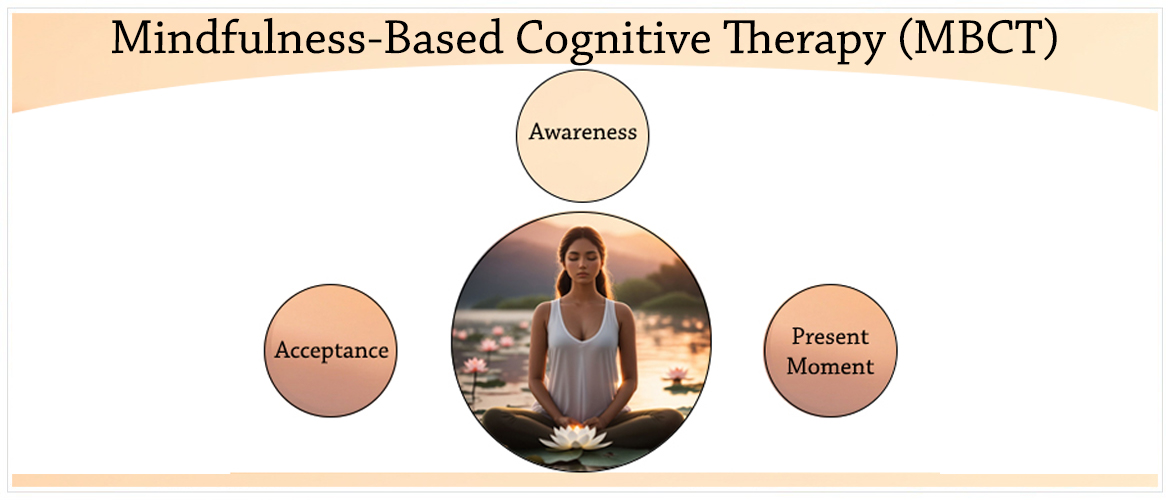
Mindfulness Practices - Mindfulness-Based Cognitive Therapy (MCBT)
Introduction
In the realm of mental health and well-being, the integration of mindfulness practices with cognitive therapy has yielded a transformative approach known as Mindfulness-Based Cognitive Therapy (MBCT). This innovative therapeutic model offers individuals valuable tools to navigate the complexities of their minds and emotions. In this article, we will delve into the essence of MBCT, its foundational principles, and the spectrum of conditions it has been designed to effectively address.What is Mindfulness-Based Cognitive Therapy (MBCT)?
Mindfulness-Based Cognitive Therapy, or MBCT, represents an evolution in the field of psychotherapy, blending elements of traditional cognitive therapy with mindfulness techniques derived from ancient contemplative practices. Developed in the early 2000s, MBCT was initially designed as a relapse prevention strategy for individuals recovering from recurrent depression. Over time, it has proven its versatility in addressing various emotional and psychological challenges.
The Core Principles of MBCT
MBCT operates on several core principles:
- Mindfulness - MBCT places a strong emphasis on mindfulness, which involves cultivating present-moment awareness without judgment. This practice enables individuals to observe their thoughts, emotions, and sensations as they arise.
- Cognitive Restructuring - MBCT incorporates elements of cognitive therapy, helping individuals recognize and challenge automatic negative thought patterns. This approach fosters a more balanced and adaptive perspective.
- Emotion Regulation - MBCT equips individuals with mindfulness tools to navigate their emotional landscapes more skillfully, reducing the likelihood of being overwhelmed by distressing emotions.
- Relapse Prevention - Originally developed for preventing relapse in depression, MBCT offers strategies to identify early warning signs of recurring mental health challenges and interrupt negative cycles.
- Acceptance - MBCT promotes acceptance of one's thoughts and emotions, acknowledging that they are part of the human experience. This non-judgmental stance can reduce inner conflict and suffering.
- Depression - MBCT is particularly well-suited for individuals with a history of recurrent depression, as it helps prevent relapse by enhancing awareness of depressive triggers and providing strategies for managing depressive symptoms.
- Anxiety Disorders - MBCT has been found beneficial for individuals with generalized anxiety disorder (GAD), social anxiety disorder, and panic disorder. It offers tools to manage anxiety by promoting present-moment awareness and reducing rumination.
- Stress Reduction - MBCT provides practical techniques to manage stress and promote well-being in individuals experiencing chronic stress or burnout.
- Substance Use Disorders - In addiction treatment, MBCT can complement traditional approaches by enhancing self-awareness and addressing the emotional triggers underlying addictive behaviors.
- Chronic Pain - MBCT has been adapted for individuals living with chronic pain, helping them manage pain-related distress and improve their quality of life.
- Eating Disorders - In the case of individuals contending with conditions such as bulimia nervosa or binge-eating disorder, MBCT focuses on tending to the emotional dimensions of these challenges, promoting the cultivation of more positive connections with food and fostering healthier body image perceptions.
Conditions MBCT Can Help Address
Mindfulness-Based Cognitive Therapy has demonstrated effectiveness in treating a range of emotional and psychological conditions, including:
Conclusion
Mindfulness-Based Cognitive Therapy (MBCT) stands as a pioneering approach that empowers individuals to cultivate a more harmonious relationship with their thoughts, emotions, and experiences. By integrating mindfulness practices with cognitive therapy techniques, MBCT offers a comprehensive toolkit for addressing various emotional and psychological challenges. Whether you are recovering from depression, grappling with anxiety, or seeking to enhance your overall well-being, MBCT provides a transformative path toward greater self-awareness and mental resilience. Contact Attend Mental Health for a trained MBCT therapist to explore how this approach can be tailored to your specific needs and contribute to your journey of healing and personal growth.Back to Our Treatment Focus
